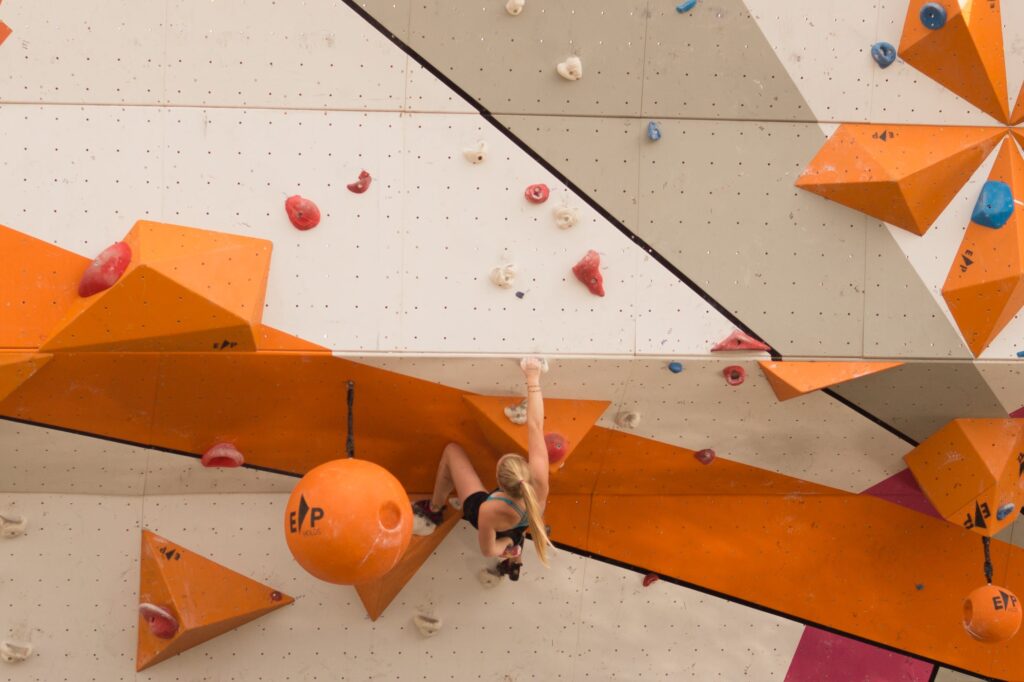/
1. What is Bouldering?
Bouldering is a style of climbing performed on shorter walls without the use of ropes or harnesses. Climbers rely on padded crash mats for safety and focus on solving short, challenging routes known as “problems.” It’s practiced both indoors at climbing gyms and outdoors on natural rock formations.
2. Why Try Bouldering?
Bouldering offers a range of benefits:
- Low Equipment Requirements: All you need are climbing shoes and chalk.
- Improves Strength and Technique: It’s a full-body workout that emphasizes problem-solving and precision.
- Community and Fun: Bouldering gyms and crags are social spaces where climbers support each other.
3. Gear You Need to Get Started
While bouldering doesn’t require a lot of gear, having the right equipment makes a big difference:
- Climbing Shoes: Look for a snug fit that balances comfort and performance. The La Sportiva Solution Comp is a great option for beginners and intermediates (Buy on Amazon).
- Chalk and Chalk Bag: Keep your hands dry for better grip. Try Metolius Super Chalk (Buy on Amazon).
- Crash Pad: If you plan to boulder outdoors, invest in a quality crash pad like the Black Diamond Circuit Pad (Buy on Amazon).
- Comfortable Clothing: Stretchy, durable clothing is essential for freedom of movement.
4. Start Indoors
Indoor climbing gyms are the ideal place for beginners to learn the basics of bouldering in a safe, controlled environment. Here’s what to expect:
- Introductory Classes: Many gyms offer classes to teach fundamentals like footwork, balance, and climbing etiquette.
- Graded Routes: Problems are typically color-coded and graded, so you can start on easy climbs and progress as you build confidence.
- Community Support: Fellow climbers are often happy to offer tips and encouragement.
5. Transitioning to Outdoor Bouldering
Once you’re comfortable indoors, take your skills outside to experience the thrill of natural boulders. Follow these steps to make the transition:
- Research Locations: Use apps like 27 Crags or Mountain Project to find beginner-friendly bouldering areas.
- Learn Outdoor Ethics: Follow Leave No Trace principles to protect the environment.
- Climb with a Buddy: Always climb with a partner for spotting and extra safety.
6. Key Skills to Focus On
- Footwork: Precise foot placements conserve energy and improve stability.
- Body Positioning: Learn to use your core and legs to reduce strain on your arms.
- Route Reading: Study the problem before climbing to plan your movements.
7. Join the Bouldering Community
Bouldering thrives on a supportive community. Get involved by:
- Attending Gym Events: Competitions, meetups, and workshops are great for meeting fellow climbers.
- Following Social Media: Connect with bouldering influencers and learn from their tips.
- Engaging Online: Join forums and local climbing groups for advice and camaraderie.
Final Thoughts
Bouldering in 2025 is more accessible and exciting than ever, thanks to advancements in gear, gym facilities, and outdoor climbing resources. Start indoors, build your skills, and take your passion outdoors. Most importantly, enjoy the process and celebrate every climb—big or small. See you on the wall!

How to start bouldering
blor
How to start bouldering
blor
How to start bouldering

Pingback: The History of Bouldering: From Its Roots to Modern-Day Culture – gearyourgrip